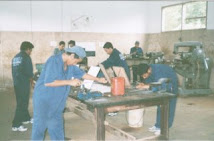
 I want people who are very deep in their discipline and can talk to each other.
I want people who are very deep in their discipline and can talk to each other.
Stan Williams, Director, Quantum Science Research, Hewlett Packard
Highly regarded researcher Stan Williams says that students often ask him what they should study to prepare for the field of nanotechnology. "I tell them to figure out what they like and get good at it and to take communications courses, whether writing or journalism," he notes. While nanotechnology is an interdisciplinary and multidisciplinary field, Williams is concerned that students could pursue too broad an education and end up knowing a little about a lot of fields, but not enough in any one field to make significant contributions.
There are undoubtedly other opinions about education in nanotechnology, and it's a subject worthy of consideration as students plan their studies. Today, few universities offer degrees in nanotechnology, although a vast number of research universities offer courses in the field. Many universities also offer undergraduate experiences in interdisplinary centers.
Degrees in Nanotechnology
In conjunction with the University of Pennsylvania, an Associate Degree in Nanobiotechnology is now offered at community colleges in Pennsylvania.
Dakota County Technical College (Rosemount, Minn.) in conjunction with the University of Minnesota, Associate in Applied Science degree in Nanoscience Technology
City University of New York offers a Ph.D. in Nanotechnology & Materials Chemistry as part of the Ph.D. program in chemistry.
Louisiana Tech University offers a Bachelor of Science in Nanosystems Engineering, a Master of Science in Molecular Sciences and Nanotechnology, and an interdisciplinary Ph.D. in Engineering that focuses on micro/nanosystems.
Rice University offers a Professional Master of Science in Nanoscale Physics
University at Albany College of Nanoscale Science and Engineering (CNSE), offers a Ph.D. and a MS in both Nanoscale Science and Nanoscale Engineering. It also offers two dual-degree "Nano+MBA" programs: MS in Nanoscale Science/Masters of Business Administration and MS in Nanoscale Engineering/Masters of Business Administration.
University of North Carolina at Charlotte, Ph.D. Program in Nanoscale Science
University of Washington, Ph.D. in Nanotechnology
North Seattle Community College offers an Associate of Applied Science-T degree in nanotechnology, soon to be joined by a certificate program.
Examples of Programs and Courses on Nanoscale Science and Engineering Offered in U.S. Colleges and Universities
Cornell University, Nanobiotechnology Course
Florida Institute of Technology, Nanoscience/Nanotechnology Lab Course
George Mason University, Graduate Certificate in Nanotechnology and Nanoscience
Kansas State University, Visual Quantum Mechanics
Michigan Technological University, interdisciplinary minor in Nanoscale Science and Engineering (Nanotechnology)
Normandale Community College, Associate in Applied Science Degree in Nanotechnology with emphasis in vacuum technology and surface science or semiconductor process technician.
Penn State University, Center for Nanotechnology Education and Utilization, Nanofabrication Manufacturing Technology (NMT) Capstone Semester, for two-year colleges
Purdue University, Graduate Level Courses in Nanoscale Science and Engineering
Rensselaer Polytechnic Institute, Nanostructured Materials
Rice University, Introduction to Nanoscience
University of Central Florida, Nanoscience and Nanotechnology Track (B.S.) Liberal Studies Major
University of Maryland, Nano-related Courses at UMD
University of Texas at Austin's Doctoral Portfolio Program in Nanotechnology is a certification program which provides a formal mechanism for recognizing and rewarding students who obtain the broad educational background necessary to become leaders in nanotechnology after graduation.
University of Washington, and Pacific Northwest National Laboratory, the Joint Institute for Nanoscience and Nanotechnology, Intensive Courses in Nanoscience and Nanotechnology
University of Wisconsin - Madison and other institutions collaborating with the UW Materials Research Science and Engineering Center on Nanostructured Interfaces, Nano-related Course Information and Syllabi
University of Wisconsin - Stout offers a Bachelor of Science in Applied Science with Nanoscience Concentration and Bachelor of Science in Engineering Technology with a Concentration in Nanotechnology. UW-Stout also offers four undergraduate courses in Nanoscience/Nanotechnology.
Other Resources:
Every summer, the National Nanofabrication Infrastructure Network hosts a Research Experience for Undergraduates Program (NNIN REU) from June to August. Engineering and science students with a genuine interest in nanotechnology are eligible if they are not graduating before the end of the program in August. Also, applicants must be Citizens or Permanent Residents of the United States. Minority and female candidates are especially encouraged to apply. For the full program information, please visit the NNIN REU Information Center.
Cornell University, Research Experience for Undergraduates at the Nanobiotechnology Center
Northwestern University, Research Experience for Undergraduates at the Nanoscale Science and Engineering Center
University of Central Florida, Research Experience for Undergraduates at the Nanoscience and Technology Center
University of North Carolina at Charlotte, NanoSURE Undergraduate Research Program
See also
Careers in Nanotechnology, Scholarships, Fellowships, & Postdoctoral Positions










Tidak ada komentar:
Posting Komentar